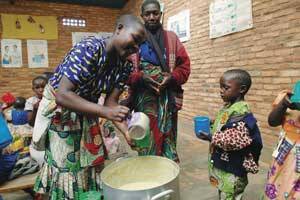The teachings of the Catholic Church and of Islam both urge believers to manage resources wisely, providing for the poorest and avoiding all waste and excess, the head of the U.N. Food and Agriculture Organization told the Synod of Bishops for Africa in Rome.
Jacques Diouf, director general of the organization and a native of Senegal, was the only Muslim invited to participate in the synod, which ends on Oct. 25. While his focus was on ending hunger and improving food security on the continent, he also spoke of the importance of faith in building a better world. The growing number of people in the world who go to bed hungry is “the result of choices made on the basis of materialistic reasons to the detriment of ethical references,” Diouf told the synod on Oct. 12.
The result is conditions of inequity and injustice “in a world where a small number of persons becomes richer and richer, while the vast majority of the population becomes poorer and poorer,” Diouf said. Today’s world has the financial power, the technology and the natural and human resources needed “to eliminate hunger in the world once for all,” he said, but first it must overcome the power of greed, corruption and selfishness.
“For the first time in the history of humanity, the number of hungry persons has reached 1 billion,” 15 percent of the global population, Diouf told the synod. He reported that more than 270 million Africans, about 24 percent of the continent’s population, are undernourished, an increase of 12 percent over a year ago. And Africa is likely to number 2 billion people—double its current population—by 2050. But it is a lack of political will to end it, not population growth, that contributes most to global hunger. The lack of efficient means of transportation, storage and packaging in Africa means that 40 percent to 60 percent of the harvests of some agricultural products are lost each year. According to Diouf, only 5 percent of development aid is dedicated globally to agricultural projects although 70 percent of the world’s poor are engaged in subsistence agriculture.
Diouf said he agrees with a key point in Pope Benedict’s encyclical, Caritas in Veritate: that every economic decision has a moral consequence. “The problem of food insecurity in this world is primarily a question of mobilization at the highest political levels so that the necessary financial resources are made available,” he said. “It is a question of priority when facing the most fundamental human needs.”
Praising the work of the Catholic Church, its charities and missionaries in Africa, Diouf underlined the role of faith in battling poverty. “A planet free from hunger is what the miracle of an unshakable faith in the omniscience of God and of the indefectible belief in humanity can lead to,” he told the synod. The United Nations is holding a world summit on food security in Rome from Nov. 16 to 18. Pope Benedict XVI is scheduled to attend the opening session.








